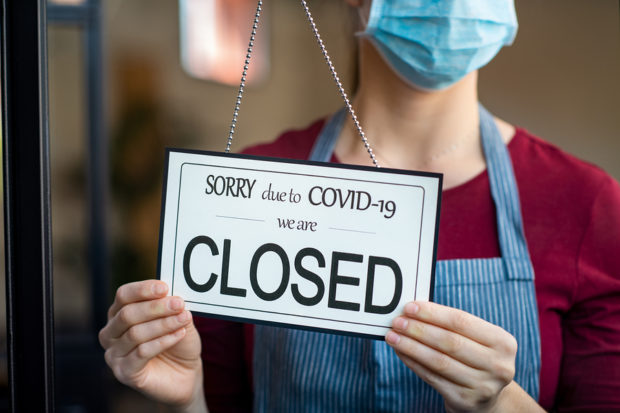In four separate decisions, a panel of the 7th Circuit Court of Appeals joined four other federal appellate courts in ruling that SARS-CoV-2 does not cause a direct physical loss or damage that triggers coverage under a commercial insurance policy.
The appellate panel affirmed decisions by three U.S. District Court judges in Chicago that found a dental practice, jewelry store, bar and restaurant, and hotels in Illinois and Texas were not entitled to coverage from their commercial property insurers for business income lost because of the coronavirus pandemic.
“While the impact of the virus on the world over the last year and a half can hardly be overstated, its impact on physical property is inconsequential: deadly or not, it may be wiped off surfaces using ordinary cleaning materials, and it disintegrates on its own in a matter of days,” the 7th Circuit panel said in an opinion written by Circuit Judge Diane Pamela Wood.
The panel rejected arguments made by Sandy Point Dental and Bend Hotel Development Co. in a lawsuit filed against Cincinnati Insurance Co. It was the lead decision in a series of four released Thursday by the same 7th Circuit panel.
“We’re still discussing what the next step is,” said Skokie, Ill., attorney Jonathan Lubin, who represented Sandy Point. “It’s obviously a disappointing ruling.”
The American Property and Casualty Insurance Association filed an amicus brief in support of Cincinnati Insurance in the Sandy Point case. In a statement, the organization noted that the 6th, 9th, 8th and 11th Circuit Court of Appeals also affirmed the dismissal of lawsuits seeking coverage for COVID-19 shutdowns, as have state appellate courts in California and Ohio.
“These policies are not intended to cover diseases or pandemic-related losses,” the APCIA said. “In the vast majority of cases, insurers did not price policies to include such coverage, and policyholders did not pay for it.”
The 7th Circuit’s opinions are the most comprehensive of the appellate court rulings so far. In addition to finding that the virus does not cause a direct physical damage or loss, the opinion disposes of a common argument used by plaintiffs in support of business interruption claims.
Because the policy covers a direct physical loss or damage, loss must mean something different than damage, the reasoning goes. That means the loss of use of the property is covered by the policy.
The 7th Circuit panel said loss can also mean the complete destruction of a property, which is how most courts have interpreted the language’s meaning under Illinois law.
The panel also rejected the argument that because insurers often exclude types of perils, such as radiation, that do not cause a physical alteration of property, then those kinds of losses must be covered if not excluded.
The panel said the premise is wrong because radiation actually does cause physical changes to properties. Moreover, the fact that the policy covers losses during the “period of restoration” indicates that the insurer was contemplating that the property would be repaired, rebuilt or replaced.
“Without a physical alteration to property, there would be nothing to repair, rebuild or replace,” the opinion says.
In a separate decision regarding a lawsuit filed by the owner of the Ritz-Carlton Hotel in Dallas against Zurich American Insurance Co., the 7th Circuit panel went out of its way to address a microorganism exclusion in the policy. The district court judge did not address arguments that the exclusion did not apply after finding there was no direct physical loss.
The plaintiff, Crescent City Hotel Owner, argued that a virus is not a living thing, meaning it is not a microorganism excluded by the policy. The appellate panel said many dictionaries, however, include viruses under the definition of microorganism. The opinion said insurance policies should be interpreted as they would be understood by the average person.
The panel ruled that the microorganism exclusion barred coverage, as did the lack of a direct physical loss.
A third 7th Circuit panel opinion affirmed dismissal of a lawsuit filed by a jewelry store and a bar and restaurant against West Bend Insurance Co. A fourth opinion affirmed dismissal of a lawsuit filed by the owner of a Quality Inn & Suites hotel against Aspen Specialty Insurance Co.
In its statement, the insurance association repeated an argument that it has been making since nearly the beginning of the pandemic that court rulings finding that business interruption coverage is owed for pandemic losses would undermine the stability of the insurance industry.
“Only the federal government can be the financial bridge for a crisis of this scale, proportion and duration,” the APCIA said.
Rep. Carolyn B. Maloney, D-New York, introduced legislation that would create a Pandemic Risk Reinsurance Program, similar to the federal government’s terrorism backstop. Maloney filed a revised version of the bill in November, titled Pandemic Risk Insurance Act of 2021.
*This article was originally published by Claims Journal, our sister publication





















 Is Risk the Main Ingredient in Ultra-Processed Food?
Is Risk the Main Ingredient in Ultra-Processed Food?  AI Got Beat by Traditional Models in Forecasting NYC’s Blizzard
AI Got Beat by Traditional Models in Forecasting NYC’s Blizzard  Teens’ First Year on the Road Most Deadly
Teens’ First Year on the Road Most Deadly  Reinsurance Program Could Wipe Out Need for Calif. FAIR Plan: Legal Exec
Reinsurance Program Could Wipe Out Need for Calif. FAIR Plan: Legal Exec 
